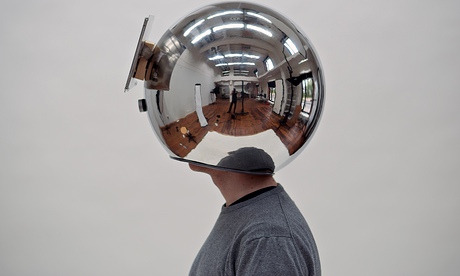 .
.
Lorenz Potthast was a first-year arts student when he designed
the Decelerator helmet – a hefty piece of headwear that allows the
wearer to experience a slowed-down world. "I didn't just want to design
another app to make grocery shopping easier," he says. "I wanted to do
something experimental that could give a real experience."
The helmet is simply a shiny metal dome that records the view from a front camera and processes it through a small computer to a screen in front of the wearer's eyes. The slow-motion is controlled by a handheld remote. "The first three minutes are just confusing, but then you get a feel for it and you become the director of your own perception," he says. "It's alienating, because you're experiencing time at a different speed to your own surroundings so you can't really interact, but it's also somehow fascinating. People often don't want to take it off again."
Despite the attraction, Potthast, 23, has no ambition to market the helmet commercially. "It was never meant as a product," he says, and yet finds himself increasingly in demand from conferences, exhibitions and entrepreneurs worldwide. The most recent was in March, from a physical rehabilitation clinic in Italy, Villa Beretta. The director, Dr Franco Molteni, had heard of the helmet and recognised its potential as a therapeutic aid for his disabled patients.
"I hoped there could be a real use for it," says Potthast, "so the call from Villa Beretta was the nicest thing that's happened to me so far." After numerous studies with volunteer patients at the clinic, Potthast and the Italian doctors eventually found an intriguing possible use for the helmet. One patient, who had suffered a stroke and could no longer fully open his hands, was motivated to overcome this physical barrier after wearing the helmet during his exercises and seeing his fingers unfold in slow motion. "It's a bit like tricking the brain," Potthast says, "but they're considering developing it into a real research topic." For Potthast and his slow-motion helmet, it seems success has been very rapid indeed.
The helmet is simply a shiny metal dome that records the view from a front camera and processes it through a small computer to a screen in front of the wearer's eyes. The slow-motion is controlled by a handheld remote. "The first three minutes are just confusing, but then you get a feel for it and you become the director of your own perception," he says. "It's alienating, because you're experiencing time at a different speed to your own surroundings so you can't really interact, but it's also somehow fascinating. People often don't want to take it off again."
Despite the attraction, Potthast, 23, has no ambition to market the helmet commercially. "It was never meant as a product," he says, and yet finds himself increasingly in demand from conferences, exhibitions and entrepreneurs worldwide. The most recent was in March, from a physical rehabilitation clinic in Italy, Villa Beretta. The director, Dr Franco Molteni, had heard of the helmet and recognised its potential as a therapeutic aid for his disabled patients.
"I hoped there could be a real use for it," says Potthast, "so the call from Villa Beretta was the nicest thing that's happened to me so far." After numerous studies with volunteer patients at the clinic, Potthast and the Italian doctors eventually found an intriguing possible use for the helmet. One patient, who had suffered a stroke and could no longer fully open his hands, was motivated to overcome this physical barrier after wearing the helmet during his exercises and seeing his fingers unfold in slow motion. "It's a bit like tricking the brain," Potthast says, "but they're considering developing it into a real research topic." For Potthast and his slow-motion helmet, it seems success has been very rapid indeed.

No comments:
Post a Comment